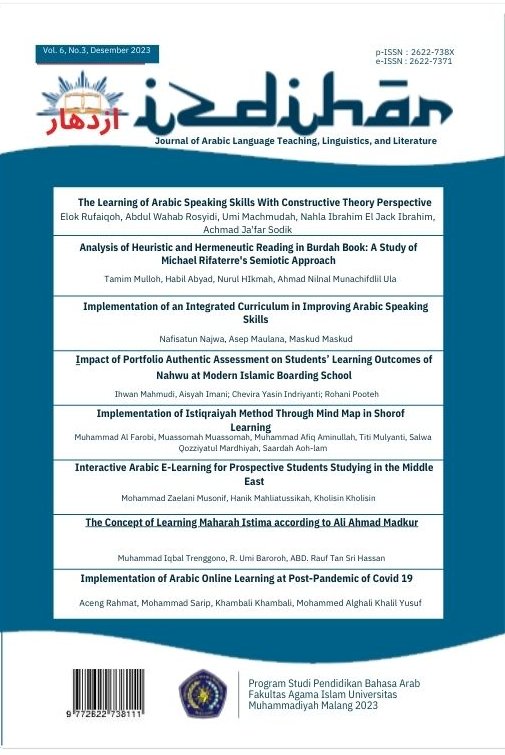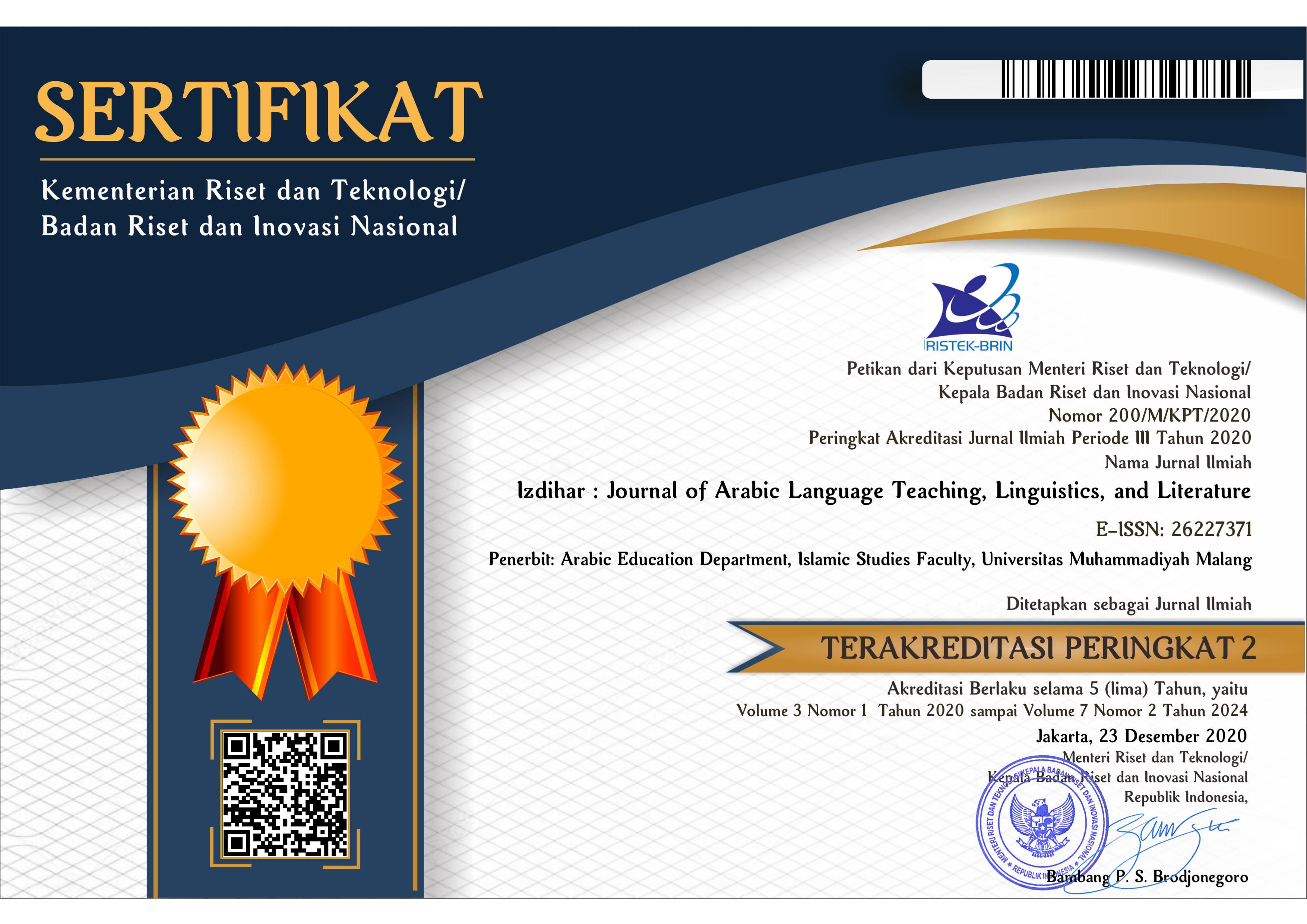The Learning of Arabic Speaking Skills With Constructive Theory Perspective
DOI:
https://doi.org/10.22219/jiz.v6i3.27405Keywords:
Arabic Language Learning, ConstructivismAbstract
The purpose of this research was to find out the concrete form of Arabic speaking skills learning with the perspective of constructivism theory at Institut Agama Islam Al-Qodiri Jember (IAI Al-Qodiri Jember), how the class setting, the learning process, and the products produced by students after learning. This study used a descriptive qualitative approach. Data collection techniques used observation and interviews. The data analysis used in this research is Miles and Huberman's data analysis theory, which includes: data collection, data simplification, data presentation, and conclusion. The results of this study concluded that: first, the class setting in Arabic speaking skills learning with the perspective of constructivism theory by the way the lecturer arranges the chairs in the class into groups. So, students can interact actively by practicing Arabic communication. Second, the process of learning Arabic speaking skill with a constructivist approach consists of three stages, namely planning, implementation, and evaluation, all of which focus on constructivist learning by paying attention to the principles contained therein. Third, the product produced by students in this lecture is a language conversation video as a concrete form of the construct results of students' thoughts about the Arabic conversation concepts they make. The process of learning Arabic speaking skills through the methods above can make students master 21st-century skills including creative thinking, communication, and collaboration.
Downloads
References
Amalia, Nabila Naili, Dkk. 2023. “Penerapan Manajemen Bi’ah Lughowiyah Program Dan Permasalahan Di Asrama Berdasarkan Madrasah Aliyah.” Izdihar : Jurnal Pengajaran Bahasa Arab, Linguistik, Dan Sastra 6(2). https://doi.org/10.22219/jiz.v6i2.24052
Araya, Claudia A. Cornejo dan Leonie Kronborg. 2021. “Inspirational Teachers’ Model: A Constructivist Grounded Theory Study in Gifted Education.” Journal for the Education of the Gifted 44 (3). https://doi.org/10.1177/01623532211023595
Arikunto, Suharsimi. 2010. Prosedur Peneltian: Suatu Pendekatan Praktik, Edisi Revisi. Rineka Cipta.
Asy’ari, Hasyim. n.d. “No Title.”
Cobern, William W. 2010. “Constructivism.” Journal of Educational and Psychological Consultation 4 (1): 105–12. https://www.tandfonline.com/doi/abs/10.1207/s1532768xjepc0401_8?src=recsys.
Ellis, Rod. 2012. Language Teaching Research and Language Pedagogy. Wiley-Blackwell.
Fachrurrozi, Aziz dan Erta Mahyudin. 2018. Strategi Pembelajaran Bahasa Arab. Lisan Arabi.
Julita Nabila dan Ahmad jauhari. n.d. “No Title.”
Kim, Jong Suk. 2005. “The Effects of a Constructivist Teaching Approach on Student Academic Achievement, Self-Concept, and Learning Strategies.” Asia Pacific Education Review 6. https://link.springer.com/article/10.1007/BF03024963.
Laila Kumi dan hendriyanto. 2021. “Menyiapkan Pendidik Profesional Di Era Society 5.0.” Direktorat Sekolah Dasar. 2021. https://ditpsd.kemdikbud.go.id/artikel/detail/menyiapkan-pendidik-profesional-di-era-society-50.
Nasrudin, M. Wahid. 2019. “Peningkatan Kualitas Pembelajaran Berbasis Konstruktivisme Melalui Media Sosial.” Jurnal Teladan 4(2). Retrieved from http://journal.unirow.ac.id/index.php/teladan/article/view/101
Nasution, Sakholid dan Zulheddi zulheddi. 2018. “Pengembangan Model Pembelajaran Bahasa Arab Berbasis Teori Konstruktivisme Di Perguruan Tinggi.” Arabi : Journal of Arabic Studies 3(2). https://doi.org/10.24865/ajas.v3i2.96
Nurlaela, Lia Fatra. 2020. “Problematika Pembelajaran Bahasa Arab Pada Keterampilan Berbicara Di Era Revolusi Industri 4.0.” Prosiding Konferensi Nasional Bahasa Arab VI Malang. https://prosiding.arab-um.com/index.php/konasbara/article/view/690.
Oppell, Monika A. von and Jill M. Aldridge. 2020. “The Development and Validation of a Teacher Belief Survey for the Constructivist Classroom.” International Journal of Educational Reform 30 (2). https://journals.sagepub.com/doi/abs/10.1177/1056787920939896.
Priyono, Dwi Juli. 2023. “No Title.”
Rahardjo, Mudjia. 2020. Pengantar Metodologi Penelitian. CV. Madza Media.
Rodriguez, Alberto J. 1998. “Strategies for Counterresistance: Toward Sociotransformative Constructivism and Learning to Teach Science for Diversity and for Understanding.” Journal of Research in Science Teaching 35 (6). https://doi.org/https://doi.org/10.1002/(SICI)1098-2736(199808)35:6<589::AID-TEA2>3.0.CO;2-I
Rosyidi, Abdul Wahab. 2016. “Penerapan Pola Nabr Dan Tanghim Dalam Maharah Al-Kalam Mahasiswa Indonesia.” Lingua 11 (1). doi: https://doi.org/10.18860/ling.v11i1.3438%0A.
sa’ud, Udin Syaefudin. 2010. Inovasi Pendidikan. Alfabeta.
Siti, Bengatun dan Rochanah Rochanah. 2019. “Pengelolaan Kelas Sebagai Upaya Menciptakan Pembelajaran Bahasa Arab Yang Efektif.” Arabia 11 (1). doi: http://dx.doi.org/10.21043/arabia.v11i1.5174.
Suparno, Paul. 1997. Filsafat Konstruktivisme Dalam Pendidikan. Kanisius.
Ugwuozor, Felix O. 2020. “Constructivism as Pedagogical Framework and Poetry Learning Outcomes among Nigerianstudents: An Experimental Study.” Cogent Education 7: 1–20. https://doi.org/10.1080/2331186X.2020.1818410.
Wahyuni, Sri, dkk. 2023. “Maharah Al-Kalam Learning Using the Word Chain Game in Madrasah.” Izdihar : Journal of Arabic Language Teaching, Linguistics, and Literature 6 (2). https://doi.org/10.22219/jiz.v6i2.22695.
Yasin, Agus, dkk. 2023. “Development of the ‘Al-Muhdastah Al-Yaumiyyah’ Textbook to Improve Arabic Speaking Skills at an Islamic Boarding School.” Izdihar : Journal of Arabic Language Teaching, Linguistics, and Literature 6 (2). https://doi.org/https://doi.org/10.22219/jiz.v6i2.22695.
Downloads
Published
How to Cite
Issue
Section
License
Copyright (c) 2023 Elok Rufaiqoh, Abdul Wahab Rosyidi, Umi Machmudah, Nahla Ibrahim El Jack Ibrahim, Achmad Ja'far Sodik

This work is licensed under a Creative Commons Attribution-ShareAlike 4.0 International License.
Copyright Notice
Authors who publish with this journal agree to the following terms:
- Authors retain copyright and grant the journal right of first publication with the work simultaneously licensed under a Creative Commons Attribution-ShareAlike 4.0 International License that allows others to share the work with an acknowledgment of the work's authorship and initial publication in this journal.
- Authors are able to enter into separate, additional contractual arrangements for the non-exclusive distribution of the journal's published version of the work (e.g., post it to an institutional repository or publish it in a book), with an acknowledgment of its initial publication in this journal.
- Authors are permitted and encouraged to post their work online (e.g., in institutional repositories or on their website) prior to and during the submission process, as it can lead to productive exchanges, as well as earlier and greater citation of published work (See The Effect of Open Access).
Copyright (c) 2019 Izdihar : Journal of Arabic Language Teaching, Linguistics, and Literature

This work is licensed under a Creative Commons Attribution-ShareAlike 4.0 International License.


















